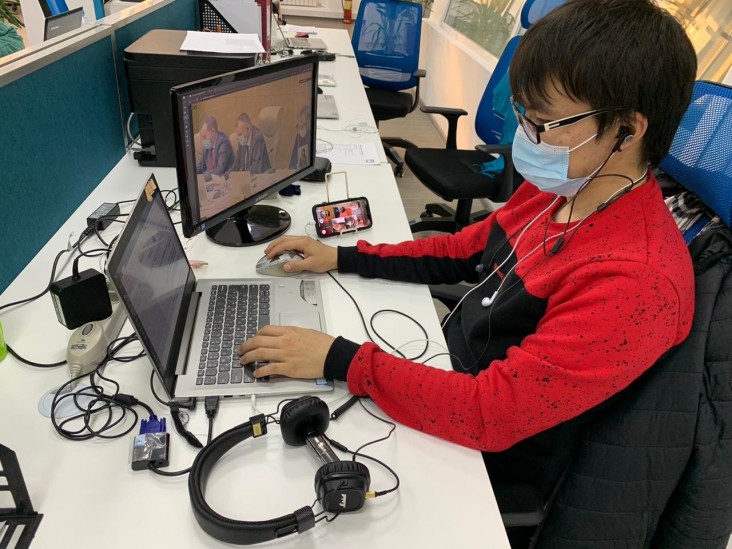Speeches Shim

A journalist from Kazakhstan is advocating for openness and accessibility of information
“The most difficult part of my job is obtaining information. Government agencies tend not to openly share and provide details. Especially in cases when we ask difficult questions, it takes a lot of effort and work,” says Serikzhan Mauletbai, a journalist from Kazakhstan. Serikzhan is also a former Chairperson of the Court Reporter’s League, a civil society organization that supports and unites journalists who report on court cases of public interest.
Serikzhan is 29 years old, he was born and raised in Karaganda, Kazakhstan. He started working as a journalist back in 2013 for independent media outlets. “I’m thankful to the editors I’ve worked with for their contribution in shaping my skills,” he says.
“In the past journalists were routinely not allowed to attend court hearings. It was up to each judge to decide on a case by case basis who was granted access to the courtroom. We didn’t have any regulations on this,” shares Serikzhan. “I even remember cases when journalists were removed from open court hearings.” With the support of USAID’s Central Asia Media Program, implemented by Internews, the Court Reporter’s League advocated on behalf of the media community for journalists’ rights to access information, particularly when covering public interest court cases in Kazakhstan.
The situation with access to information was further complicated due to the COVID-19 pandemic. Before the pandemic, journalists had the opportunity to approach government officials after events and ask questions on the sidelines. “Once press conferences moved to an online format, they became highly regulated which created limitations and we couldn’t get the answers we were looking for,” explains Serikzhan.
Following the lockdown instituted to contain the spread of COVID-19 in Kazakhstan in March 2020, journalists encountered difficulties with attending online court hearings due to complicated procedures. As a result of this issue, several high profile cases did not receive appropriate media coverage and public attention and scrutiny.
The Court Reporter’s League under Serikzhan’s leadership, Internews, and other local partners developed and suggested a simple four-step process that enabled journalists to access online court hearings. In May 2020, thanks to the civil society's advocacy efforts, the Supreme Court formalized this process to grant journalists access to online court hearings.
With USAID’s support, the Court Reporters’ League also established close cooperation with the Supreme Court, which enabled a direct line of communication with senior representatives of the Supreme Court of Kazakhstan. This proved to be helpful in promptly resolving issues with access to court hearings for media outlets.
In 2020, media advocates reached another important milestone. Previously, important government press conferences such as COVID-19 related briefings were highly moderated, censoring out tough questions and rephrasing difficult questions making them sound less critical and thus less “inconvenient” for officials. An appeal, signed by 160 members of the media community in just one day, resulted in an impressive change: the government started conducting its press briefings via a live video conference, giving journalists the opportunity to ask questions and follow ups during the live event.
Serikzhan enjoys working as a journalist because it is very dynamic and journalists can change the course of events. “Despite the difficulties and limitations, we have the opportunity to talk about issues people face and communicate them to decision-makers. It is very rewarding to see the results of your work,” says Serikzhan.
USAID’s Central Asia Media Program provides assistance including training and mentorship to support the Court Reporter’s League. Serikzhan also participated in a USAID-supported study tour to learn from the access to information and public relations practices of courts in Sweden. These efforts have helped the organization to advocate more effectively on behalf of court reporters and the broader media community, which resulted in two key policy changes that safeguard Kazakhstani journalists’ right to information.
“In the fall of 2019, I participated in a USAID-supported study tour to Stockholm. The group consisted of journalists and judges. It was a great opportunity to informally discuss our issues and network,” says Serikzhan. On that trip Serikzhan learned firsthand about how journalists united and formed organizations to stand up for their rights. It inspired him. “My goal is to support establishing a civil society organization that would unite journalists in addressing issues we face here in Kazakhstan.”

Comment
Make a general inquiry or suggest an improvement.